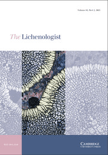
LICHENOLOGIST
Scope & Guideline
Advancing Lichen Research for a Greener Tomorrow
Introduction
Aims and Scopes
- Taxonomy and Systematics of Lichens:
The journal consistently publishes research focused on the identification, classification, and phylogenetic relationships of lichen species, contributing to a clearer understanding of lichen diversity. - Ecological Interactions and Habitat Preferences:
Research articles often explore the ecological roles of lichens, their habitat preferences, and their interactions with other organisms, highlighting the importance of lichens in various ecosystems. - Molecular and Morphological Studies:
There is a strong emphasis on integrative approaches combining molecular techniques with morphological analyses to study lichen diversity and evolutionary relationships. - Conservation and Biodiversity:
The journal addresses conservation issues related to lichens, including studies on rare or endangered species and the impact of environmental changes on lichen communities. - Global Distribution Patterns:
Research often investigates the biogeography of lichens, providing insights into their distribution across different regions and the factors influencing these patterns.
Trending and Emerging
- Climate Change and Lichen Responses:
There is a growing body of research examining the impact of climate change on lichen communities, including studies on physiological responses and shifts in distribution patterns as a result of changing environmental conditions. - Molecular Phylogenetics and Genomics:
The journal has seen an increase in publications utilizing molecular techniques to resolve phylogenetic relationships and genetic diversity among lichen species, reflecting advancements in genomic technologies. - Lichens as Bioindicators:
Research exploring the use of lichens as bioindicators for environmental monitoring is on the rise, highlighting their sensitivity to pollutants and habitat changes, making them critical for assessing ecosystem health. - Urban Ecology and Lichens:
Emerging studies focus on the role of lichens in urban environments, addressing how urbanization affects lichen diversity and distribution, and promoting the importance of urban biodiversity. - Integrative Approaches to Lichenology:
There is a noticeable trend towards integrative research that combines ecological, molecular, and morphological methods, indicating a shift towards more comprehensive studies that reflect the complexity of lichen systems.
Declining or Waning
- Traditional Morphological Studies:
There seems to be a decline in purely morphological studies of lichens, with researchers increasingly leaning towards molecular techniques and integrative approaches that combine both morphological and genetic data. - General Surveys of Lichen Flora:
Broad surveys documenting lichen flora in specific regions are less frequent, as the journal shifts towards more targeted studies that address specific ecological or evolutionary questions. - Historical Lichenology:
Research focusing on historical aspects of lichenology, such as the historical distribution of lichens or traditional uses in local cultures, appears to be less common, indicating a shift towards contemporary ecological and conservation issues.
Similar Journals
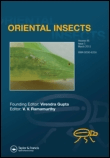
ORIENTAL INSECTS
Unveiling the Secrets of the Insect WorldORIENTAL INSECTS is a distinguished journal dedicated to advancing the field of Insect Science, published by the reputable Taylor & Francis Ltd. With its long-standing history since 1967, this journal provides a platform for innovative research focused specifically on the diverse insect fauna of the Oriental region, encompassing topics such as taxonomy, ecology, physiology, and behavior. The journal is indexed with an ISSN of 0030-5316 and an E-ISSN of 2157-8745, making it easily accessible to a global audience. Although it currently does not operate under an Open Access model, its rigorous peer-review process ensures the dissemination of high-quality research. As a Q4 journal in the Insect Science category for 2023 and ranked 103 out of 181 in Scopus, ORIENTAL INSECTS remains a vital resource for researchers, professionals, and students seeking to enhance their understanding of insect biodiversity and conservation. Located in the United Kingdom, it is committed to promoting the latest scientific findings and fostering collaboration among entomologists worldwide, contributing significantly to the academic community.
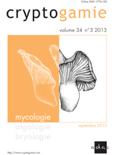
CRYPTOGAMIE MYCOLOGIE
Pioneering Research at the Intersection of Mycology and BiodiversityCRYPTOGAMIE MYCOLOGIE is a prestigious journal published by ADAC-CRYPTOGAMIE dedicated to the study of mycology within the context of ecology, evolution, and biodiversity. With an ISSN of 0181-1584 and an E-ISSN of 1776-100X, this journal is recognized for its significant contributions to advancing knowledge in the field, holding a Q1 ranking in the 2023 Ecology, Evolution, Behavior and Systematics category on Scopus, placing it within the top tier of scholarly publications. Since its inception, with publication years converging from 1990 to 1993 and then from 1995 to 2024, it has served as a vital resource for researchers, professionals, and students alike, offering the latest findings, reviews, and methodologies in mycology. Despite being published without open access options, the journal maintains a strong academic standard and impact factor, established through a rigorous peer-review process. The journal is based in Paris, France, and aims to foster interdisciplinary research that bridges gaps between mycology and related ecological fields.

ANNALES ZOOLOGICI FENNICI
Celebrating Four Decades of Zoological ExcellenceANNALES ZOOLOGICI FENNICI, published by the Finnish Zoological Botanical Publishing Board, is a prominent scientific journal dedicated to advancing the fields of Animal Science, Zoology, Ecology, Evolution, Behavior, and Systematics. Based in Finland and serving an international audience, this journal has been an essential resource since its inception in 1974, offering valuable insights into biodiversity, conservation, and ecological dynamics. While it holds a respectable Q3 quartile ranking across several relevant categories in 2023, its impactful contributions to the scientific community continue to promote critical discussions and foster research collaborations. Although the journal is not currently open access, its robust indexing in Scopus and recognition within the academic community underscore its significance. As a researcher, professional, or student, engaging with the ANNALES ZOOLOGICI FENNICI not only enriches your knowledge but also aligns you with the forefront of zoological research and conservation studies.
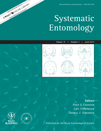
SYSTEMATIC ENTOMOLOGY
Fostering Excellence in Insect Research and MethodologySYSTEMATIC ENTOMOLOGY is a premier journal published by Wiley, specializing in the field of entomology with a particular focus on insect systematics, ecology, evolution, and behavior. With its strong academic reputation, this journal has achieved a remarkable Q1 ranking in both Ecology, Evolution, Behavior and Systematics and Insect Science categories, affirming its influence and importance in advancing research in these critical areas. SYSTEMATIC ENTOMOLOGY has a broad scope, making it a valuable source for original research, reviews, and methodological advancements that contribute to the understanding of insect biodiversity and systematics. Operating from the United Kingdom, the journal is dedicated to fostering knowledge and innovation within the scientific community, ensuring that high-quality research is accessible to researchers, professionals, and students alike. The journal's consistent publication since 1976 and its continued relevance up to 2024 exemplify its commitment to the field and its readers.

TAIWANIA
Advancing ecological knowledge, one discovery at a time.TAIWANIA is a prestigious and long-standing journal dedicated to the fields of ecology, evolution, and systematics, published by NATIONAL TAIWAN UNIVERSITY PRESS. Since its inception in 1947, this open-access journal has provided a vital platform for researchers to disseminate their findings, encouraging collaboration and innovation in the ecological sciences. With a 2023 impact factor placing it in Quartile 2 for Ecology and Quartile 3 for Ecology, Evolution, Behavior and Systematics, TAIWANIA is recognized for its quality and influence, ranking #267 out of 461 in Environmental Science and #426 out of 721 in Agricultural and Biological Sciences within Scopus. The journal currently publishes contributions from both local and international researchers, showcasing a diverse array of topics that address crucial ecological issues and facilitate the advancement of knowledge in the discipline. For those seeking rigorous research, engaging reviews, and a commitment to open access, TAIWANIA remains a significant resource for the global scientific community.

CONTRIBUTIONS TO ZOOLOGY
Discovering New Horizons in Animal EcologyCONTRIBUTIONS TO ZOOLOGY, published by BRILL, is a premier scholarly journal dedicated to advancing the field of zoological sciences. With an ISSN of 1383-4517 and an E-ISSN of 1875-9866, this journal serves as a vital platform for researchers, professionals, and students seeking to share their findings and insights related to animal science, ecology, evolution, and systematics. Recognized for its high academic standards, it ranks in the top quartile (Q1) for Animal Science and Zoology, and Q2 for Ecology, Evolution, Behavior, and Systematics, reflecting its significance and influence in the scholarly community. The journal has been consistently published since 1994 and continues to contribute pivotal knowledge that informs and shapes contemporary zoological research. Researchers can access the journal through traditional subscription models, ensuring broad dissemination of its impactful articles and studies. Contributions to Zoology plays an essential role in fostering collaboration and discussion within the zoological community in the Netherlands and beyond.

BRITTONIA
Connecting Researchers Through Plant Science InsightsBRITTONIA, published by Springer, stands as a reputable journal dedicated to advancing the fields of botany and plant sciences. With a storied history dating back to 1931, this journal has evolved to embrace contemporary research spanning various aspects of plant biology, ecology, and systematics. Focusing on a comprehensive analysis of both ecological interactions and plant systematics, BRITTONIA plays a crucial role in disseminating knowledge among researchers and professionals committed to understanding plant life and its environmental contexts. Despite its open access status being currently unavailable, the journal ensures wide accessibility through institutional subscriptions. In the latest rankings, it proudly holds a Q2 category in Plant Science and a Q3 category in Ecology, Evolution, Behavior, and Systematics, indicating its growing influence and academic rigor. Researchers and students alike will find BRITTONIA an essential resource for the latest findings and discussions in plant sciences.
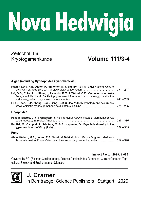
NOVA HEDWIGIA
Advancing the Frontiers of Ecology and EvolutionNOVA HEDWIGIA is a premier journal dedicated to the fields of ecology, evolution, behavior, and systematics, as well as plant sciences. Published by GEBRUDER BORNTRAEGER in Germany, this journal serves as a vital platform for researchers, professionals, and students seeking to disseminate and engage with high-quality studies and findings. With an ISSN of 0029-5035 and an E-ISSN of 2363-7188, NOVA HEDWIGIA has established its significance within these disciplines, reflected in its current Scopus rankings, which place it in the third quartile of both ecology and plant science categories. This esteemed publication has contributed to the advancement of knowledge and innovation since its inception in 1993, continuing through 2024, offering valuable resources for an ever-evolving academic landscape. Researchers looking to contribute to ecological studies or plant sciences will find NOVA HEDWIGIA an ideal venue for sharing their work, nurturing their academic pursuits, and joining a community passionate about the natural sciences.
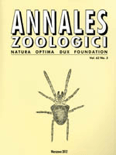
ANNALES ZOOLOGICI
Connecting Research and Conservation EffortsANNALES ZOOLOGICI is a distinguished academic journal published by the Museum & Institute of Zoology, Polish Academy of Sciences, based in Warsaw, Poland. With a long-standing tradition in zoological research, this journal has evolved to encompass a diverse range of studies in ecology, evolution, behavior, and systematics, aiming to foster a deeper understanding of animal biology and conservation. It holds a commendable Q2 classification in the 2023 Ecology, Evolution, Behavior and Systematics category, indicating its significant contribution to the field. Although ANNALES ZOOLOGICI is not an open-access publication, it remains accessible to a global audience of researchers, professionals, and students aiming to advance their knowledge and engage with cutting-edge zoological findings. As of 2024, this journal continues to be a vital resource for those eager to explore the complexities of animal life and contribute to ongoing discussions within this essential scientific discipline.
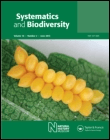
SYSTEMATICS AND BIODIVERSITY
Illuminating the path to understanding biological diversity.Systematics and Biodiversity, published by Taylor & Francis Ltd, is a prominent academic journal that provides a vital platform for advancing research in the fields of ecology, evolution, and plant science. With an ISSN of 1477-2000 and an E-ISSN of 1478-0933, the journal has established itself as a reputable source of scholarly information since its inception in 2003, and continues to publish cutting-edge studies through 2024. Recognized for its rigorous peer-review process, it holds a prestigious position in academic circles, reflected by its Q2 ranking in Ecology, Evolution, Behavior and Systematics and Q1 ranking in Plant Science as of 2023. The journal's contributions are further characterized by its strong performance in Scopus rankings, placing it in the 69th and 68th percentiles in its respective categories. Researchers, professionals, and students alike will find invaluable insights and innovative methodologies within its pages, making Systematics and Biodiversity an essential resource for those dedicated to understanding the complexities of biological diversity and systematics. The journal's impact factors and commitment to high-quality research underscore its significance in shaping the future of ecological and botanical studies.